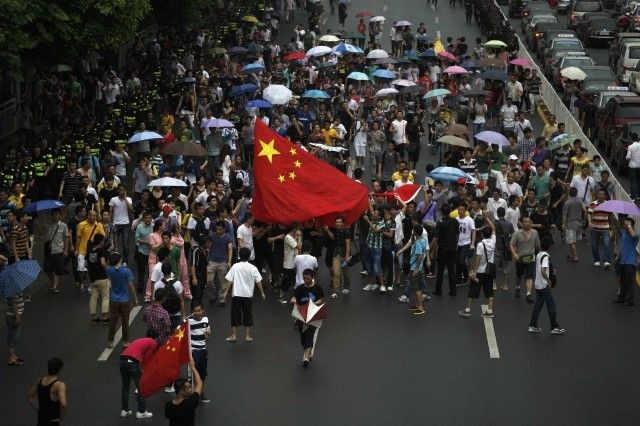Why China Attempts To Ease The Bout Of Anti-Japanese Anger

After a weekend of aggressive display of nationalism, the Chinese government and media sought to ease the public's anti-Japan hostilities that erupted in major cities across China over a group of islands in the East China Sea claimed by both the nations.
Chinese protestors took to the streets Sunday in the biggest anti-Japanese protests in seven years, inflicting damage to Japanese restaurants and vehicles in Shenzhen and Hangzhou in the eastern province of Zhejiang. The demonstrators staged a noisy sit-in at the gates of the Japanese consulate in Guangzhou, burned Japanese flags, proclaiming the island as Chinese territory and declaring that Japan had no rights over it.
The anti-Japanese sentiments flared when a group of Chinese nationals, who were photographed hoisting flags on one of the islands of the Senkaku chain on Aug. 15, the 67th anniversary of Japan's surrender in the Second World War, were arrested by the Japanese authorities. The intruders were deported to Hong Kong two days later.
"Although Chinese authorities have encouraged the country's citizens to express their patriotism peacefully, the government ultimately rejects the kind of blind patriotism that can result in violence, especially against Chinese compatriots," China's official Xinhua news agency said in an article published Monday which described the public aggression as "ugly" and "uncalled for."
Photos of the vandalized Japanese properties and vehicles, which spread through social networking sites, triggered "fierce opposition to the mindless violence demonstrated by the protestors," Xinhua said.
The China Youth Daily, The official newspaper of the Communist Youth League, said Monday that the hostile acts, which caused damage to China's public property and its global image, were "extremely stupid."
"This kind of patriotism will never win praise. Instead, it will make the real patriots feel ashamed," said the commentary.
However, the Chinese media's stance that the public emotion was unwarranted appeared diametrically opposite to an editorial published last week by China's Global Times, controlled by the Communist Party's People's Daily.
The Global Times said that China will be forced to "send warships to the Diaoyu Islands' waters" if Japan sent Self-Defense Forces against the "Chinese grass-roots activists."
Luo Qiang, the chief of the Coomunist Party of China (CPC) in the city of Mianyang in southwest China's Sichuan province, called the protestors' behavior inappropriate adding that it will only cause damage to the fellow Chinese and "do the Japanese a favor," Xinhua reported.
"These actions will only dismay our friends and relatives while giving comfort to the Japanese," Luo said.
Explaining the reason for the ruling Communist Party's efforts to tone down the nationalism, Gordon Chang, author and columnist, wrote in a World Affairs Journal article: "In China's past, anti-Japan demonstrations have turned anti-government."
"Since the early 1990s, authorities have encouraged hatred of Japan with unrelenting indoctrination in the schools and incessant propaganda in society," he wrote. "It is not surprising, therefore, that the demonstrations this weekend reflected an ugly nationalism."
"The Chinese government is a master of containing popular discontent. The authorities this weekend largely let the street protests run their course, and many China watchers believe anger will quickly cool as people finish venting emotions," he said.
According to Hong Kong media reports, the Chinese authorities have ordered the national media to follow Xinhua reports when covering the anti-Japanese protests.
© Copyright IBTimes 2025. All rights reserved.






















